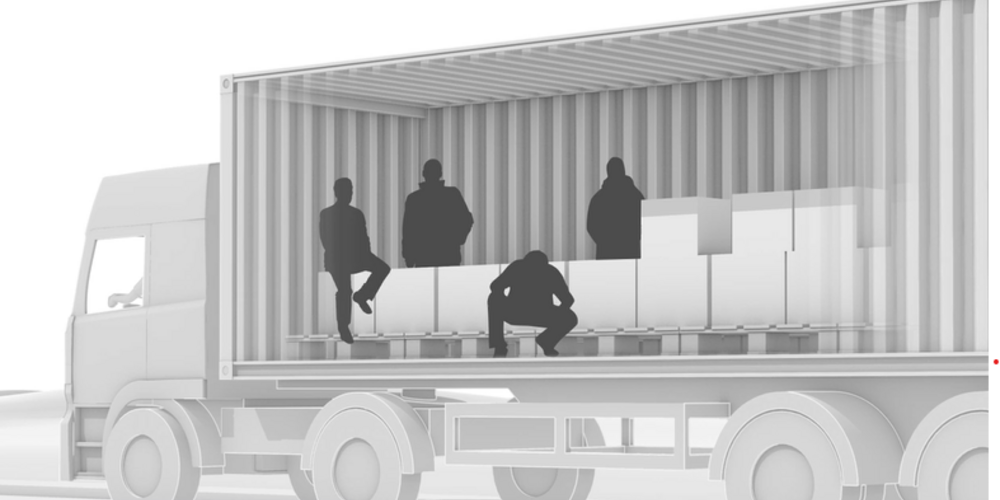TT Talk - Clandestine migration in freight

As previously highlighted, risks associated with clandestine migration around the world include impact on the freight supply chain. Criminal organisations behind this illicit activity have long realised that the legitimate logistics operations present very efficient means of moving people, often undetected, across key borders.
General media across the globe frequently focus on migration, but rarely identify the exposure that is faced by logistics operators. While other modes of transport are not without challenges, these risks are most prevalent through the road mode. Trucks, trailers and containers are most easily accessible whilst being moved on public roads. They are prone to frequent stops – either in traffic or during necessary breaks – whilst on route to port facilities or border crossings, providing adequate opportunity for bad actors to intervene. Furthermore, there have been numerous cases whereby people have been discovered in concealed sections of trailers and trucks following far more purposeful activity.
While other modes of transport are not without challenges, these risks are most prevalent through the road mode
There is a highly emotive human element to this aspect of criminality. Individuals paying (usually disproportionately) to be trafficked are typically seeking a better life for themselves and their families, whether avoiding war, poverty or both. Unfortunately, the criminals behind this activity are quick to exploit desperate circumstances and rarely care if those individuals reach the intended destination or not;. The criminals are motivated only by the fee they charge for their “service”.
There have been several examples where multiple people have been discovered in trucks and trailers, tragically, cases of reported fatalities are not uncommon. Further examples that those organising these movements are doing so without any concern for the wellbeing of the people being trafficked are common.
An incident in February this year noted the discovery of 40 people in an abandoned truck in Bulgaria. The migrants travelling from Afghanistan were discovered in a concealed compartment under a cargo of timber. Horrifically 18 of the immigrants were found to have suffocated during the journey.
In June 2022, 62 migrants were discovered in a truck in San Antonio, Texas. Of these, 46 appeared to have been overcome by the extreme heat during the journey and lost their lives, their bodies “stacked” in the cargo space by the 16 survivors; the bodies were reportedly hot to the touch upon discovery.
Such examples display the multinational scope of this activity. Some jurisdictions have sought to penalise logistics operators, not only in relation to migrants actually found, but also potentially in relation to perceived security deficiencies. By way of example, recent substantial changes in the level of penalty in the
The United Kingdom have necessarily given profile to the government Vehicle Checklist and guidance on Preventing clandestine entrants (both in multiple languages). There is a useful commentary provided by BIFA, the UK freight association, in their recent newsletter article.
Other jurisdictions are likely to have different specific guidance and, potentially, checklists. While there may justifiably be questions or comments on any of these, it is apparent that there risks need to be managed and, furthermore, that rigorous documentary records will support any operator in the event that any border control raises an issue.
Three fundamental steps are recommended:
- Provide adequate training for drivers on how to avoid becoming involved with clandestine migrants. This should involve producing written security procedures, including vehicle security checklists;
- Deploy robust security devices to secure the vehicle, goods and cargo space. Ensure that drivers are fully briefed on their use; and
- Monitor compliance with all procedures.
Essential measures
Once procedures are established, there are practical measures to be implemented throughout the intended journey – before packing, during the packing process and finally, during transit.
Before packing takes place, ensure that the condition of the unit – particularly curtain-sided trailers – is such that unauthorised entry is prevented.
As far as possible, ensure that no persons gain entry during packing and instruct the driver only to sign a clean packing receipt when a proper check of the consignment is possible. Check the entirety of the seal cord (TIR Cord), in particular its ends and the seal strip, to ensure that it is intact and free from cracks, and has not been cut and put back together.
During transit, it is inevitable that the trailer or unit will at times be left unattended (such as during meals, overnight or at terminals). Drivers should be instructed to check for signs of any tampering on return to the vehicle and to complete a security checklist. For accompanied movements, deploying something as simple as a baby alarm in the trailer, with the control unit in the driver's cab, will provide an alert and security equipment, such as cameras, may also assist in detecting activity.
Whenever, despite following these recommendations, there is the slightest suspicion that someone has gained access to the trailer, irrespective of the location, the driver should immediately alert the local authorities (police, customs, ferry operator, etc.), but not seek to confront any clandestine migrants.
Whilst owners, hirers or drivers may contract with third parties to conduct the required checks on their behalf, they are likely to remain liable to any penalty incurred in the event of failure to have an effective system in place or to operate it properly. Due diligence in the selection of such contractors is therefore critical.
-
If you would like further information, or have any comments, please email us, or take this opportunity to forward to any others who you may feel would be interested.
Documents
TT Talk Edition 297 Simplified Chinese (585 kB) 14/04/2023
- Author
- Mike Yarwood
- Date
- 04/04/2023





